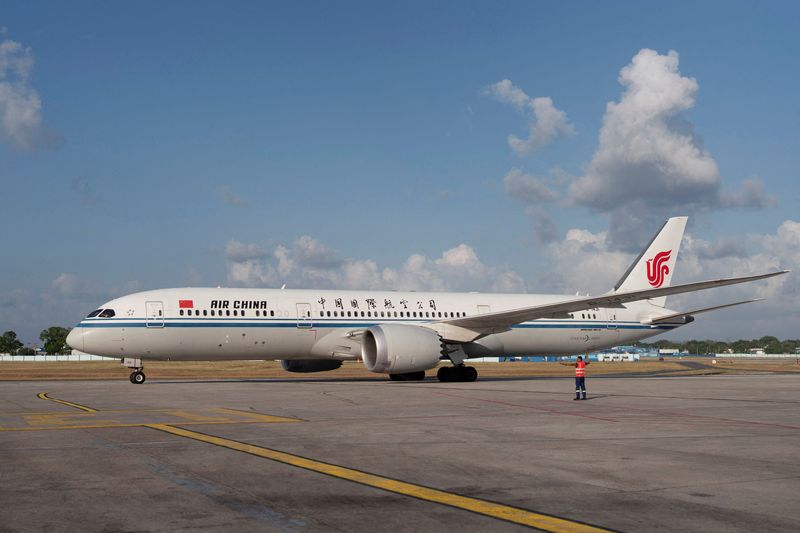BEIJING (Reuters) -China's leading state-owned airlines posted losses in the first half of the year, weighed down by a slower-than-expected rebound in international travel, domestic oversupply, and more intense competition as aviation capacity returns globally.
China's top three airlines - Air China (OTC:AIRYY), China Southern Airlines and China Eastern Airlines (OTC:CEAYY) - last reported annual net profits in 2019 before the COVID-19 pandemic took hold.
China Eastern, headquartered in Shanghai, reported a first-half loss of 2.8 billion yuan ($395 million) on Friday, compared with a loss of 6.2 billion in the same six months of last year.
"Ticket prices in the domestic market have decreased year-on-year ... due to intensified competition in the domestic passenger transportation market, lower-than-expected recovery of some international markets, as well as the competition from high-speed rail," it said in a filing.
The country's flagship carrier Air China posted a first-half net loss of 2.78 billion yuan, narrower than a loss of 3.45 billion in the same period last year, it said on Thursday.
China Southern Airlines reported a net loss of 1.23 billion yuan in the first half, narrowing from a 2.9 billion loss a year earlier. The Guangzhou-based airline made a 760 million yuan profit in the first quarter.
Air China said international traffic grew in the first half, with passenger numbers above 80% of 2019's pre-pandemic levels. But it said its traditionally "advantageous" North American routes were recovering slowly.
LOW DEMAND
Flights between China and the United States have been held up by political issues and low demand and are around a fifth of what they were in 2019, flight schedule data from Cirium and China-based aviation data provider VariFlight show.
"As international routes are not resumed fully, wide-body planes are used domestically, intensifying oversupply," Air China said.
Outbound traffic from China has been growing since pandemic-related restrictions were lifted as 2023 began, but the recovery in overseas travel is lagging behind market expectations due to a faltering economy and a turn toward domestic travel.
In July there were 23% fewer flights out of China than in the same month of 2019, while the number of domestic flights was 15% higher, Cirium data shows, though Chinese airlines are gaining international market share against foreign rivals.
Airlines globally are seeing softening fares and profitability as planes return to the sky and a global imbalance between seats and travel demand evens out.
HSBC analysts said in a June note they expected China outbound travel to continue recovering as air capacity and visa requirements improve, "but the domestic travel market may face pressure as tourists go overseas".

Air China and China Southern this week became the second and third Chinese carriers to start operating China's homegrown COMAC C919 passenger jet.
($1 = 7.0870 Chinese yuan renminbi)